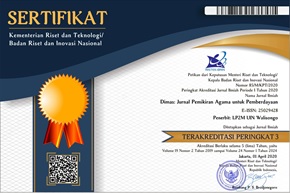Positive Self-Talk Intervention to Decrease Stress in Parents of Children with Special Needs
DOI:
https://doi.org/10.21580/dms.2022.222.13270Keywords:
Positive Self Talk, parent, Children with Special Needs, StressAbstract
The caregiving experience of parents of children with special needs (CSN) can be challenging and can lead to significant stress and negative impacts on mental health. To address this issue, a community service activity was implemented to provide positive self-talk training to 25 parents of CSN who are members of the Indonesian Special Family Forum (FORKESI) in South Sumatra. The training was conducted online using the Zoom Meeting platform and employed the Asset Based Community Development (ABCD) method. The results of the community service indicated that the average stress levels of the participants decreased after participating in the training. Additionally, participants reported feeling more grateful for the condition of their children, more accepting of their children's condition, and having more open minds. These findings suggest that positive self-talk training is an effective strategy for reducing stress in parents of children with special needs and may have broader implications for supporting caregivers in the community.
Downloads
References
Ahern, L. S. (2005). Psychometric properties of the parenting stress index-short form [North Carolina State University]. https://repository.lib.ncsu.edu/handle/1840.16/2765
Amelasasih, P. (2018). Resiliensi Orangtua Yang Mempunyai Anak Berkebutuhan Khusus. Psikosains: Jurnal Penelitian Dan Pemikiran Psikologi, 11(2), 72–81. https://doi.org/10.30587/psikosains.v11i2.638
Bazzano, A., Wolfe, C., Zylowska, L., Wang, S., Schuster, E., Barrett, C., & Lehrer, D. (2015). Mindfulness Based Stress Reduction (MBSR) for Parents and Caregivers of Individuals with Developmental Disabilities: A Community-Based Approach. Journal of Child and Family Studies, 24(2), 298–308. https://doi.org/10.1007/s10826-013-9836-9
Dabrowska, A., & Pisula, E. (2010). Parenting stress and coping styles in mothers and fathers of pre-school children with autism and Down syndrome. Journal of Intellectual Disability Research, 54(3), 266–280. https://doi.org/10.1111/j.1365-2788.2010.01258.x
Deater-Deckard, K., & Panneton, R. (2017). Parental Stress and Early Child Development (K. Deater-Deckard & R. Panneton (eds.)). Springer International Publishing. https://doi.org/10.1007/978-3-319-55376-4
Effendi, F., Haris, A., & Darmayanti, N. (2022). Pengaruh Kepuasan Kerja dan Positive Self-Talk Terhadap Stres Kerja Pada Pemasar Kartu Kredit Debit. Diversita, 8(2), 241–247. https://doi.org/10.31289/diversita.v8i2.8083
Eky Vikawati, N., Linda Destiana, A., & Wahyuningsih, H. (2018). Tingkat Depresi Keluarga Dengan Anak Berkebutuhan Khusus (Abk) Di Sekolah Luar Biasa (Slb) Kabupaten Kendal. YARSI Medical Journal, 26(3), 152–162. https://doi.org/10.33476/jky.v26i3.759
Hidayah, N. (2014). Efektivitas Group Positive Psychotherapy Untuk Meningkatkan Kesejahteraan Psikologis Pada Orang Dengan HIV/ AIDS (ODHA). Universitas Muhammadiyah Surakarta.
Hidayanti, E. (2013). Optimalisasi Pelayanan Bimbingan dan Konseling Agama Bagi Penyandang Masalah Kejehteraan Sosial (PMKS). Dimas: Jurnal Pemikiran Agama Untuk Pemberdayaan, 13(2), 361–386. https://doi.org/10.21580/dms.2013.132.59
Hidayati, D. L., & Aisha, M. N. (2022). Living with Hope: Resilience Among Parent/s of Children with Autism in Palembang Therapy Center. INKLUSI, 9(1), 81–98. https://doi.org/10.14421/ijds.090105
Kesuma, F. F. W., & Jannah, M. (2015). Pengaruh Self Talk Terhadap Kecemasan Atlet Senam Ritmik. Character, 3(2). https://ejournal.unesa.ac.id/index.php/character/article/view/10960
Kirana, W., & Litaqia, W. (2022). Self Talk Positive dalam Menurunkan Tingkat Kecemasan dan Stres Garda Terdepan Penanganan Covid-19. Buletin Al-Ribaath, 19(1), 55–60. https://doi.org/10.29406/br.v19i1.3434
Lauria, M. J., Gallo, I. A., Rush, S., Brooks, J., Spiegel, R., & Weingart, S. D. (2017). Psychological Skills to Improve Emergency Care Providers’ Performance Under Stress. Annals of Emergency Medicine, 70(6), 884–890. https://doi.org/10.1016/j.annemergmed.2017.03.018
Majdi, M. Z. Z., Purwanto, E., & Sunawan. (2019). Group Counseling with Self-Talk Technique and Stress Inoculation Training to Enhance Students’ Eustres. Jurnal Bimbingan Konselin, 8(2), 125–133. https://journal.unnes.ac.id/sju/index.php/jubk/article/view/28171
McConnell, D., & Savage, A. (2015). Stress and Resilience Among Families Caring for Children with Intellectual Disability: Expanding the Research Agenda. Current Developmental Disorders Reports, 2(2), 100–109. https://doi.org/10.1007/s40474-015-0040-z
Muniroh, S. M. (2012). Dinamika Resiliensi Orang Tua Anak Autis. Jurnal Penelitian, 7(2). https://doi.org/10.28918/jupe.v7i2.112
Muslim, M. (2020). Manajemen Stress pada Masa Pandemi COVID-19. ESENSI: Jurnal Manajemen Bisnis, 23(2). https://doi.org/10.55886/esensi.v23i2.205
Nugroho, E., Joswanto, A., Trisnaningtyas, V., & Simon. (2022). The Power of Self-Talk: Kekuatan menggunakan Firman Allah untuk Bicara pada Diri Sendiri sebagai Dasar Intropeksi Diri. Xairete: Jurnal Teologi Dan Pendidikan Kristiani, 2(1), 15–31. https://e-journal.sttkai.ac.id/index.php/xairete/article/view/20
Peer, J. W., & Hillman, S. B. (2014). Stress and Resilience for Parents of Children With Intellectual and Developmental Disabilities: A Review of Key Factors and Recommendations for Practitioners. Journal of Policy and Practice in Intellectual Disabilities, 11(2), 92–98. https://doi.org/10.1111/jppi.12072
Sadri Damirchi, E., Mojarrad, A., Pireinaladin, S., & M Grjibovski, A. M. (2020). The Role of Self-Talk in Predicting Death Anxiety, Obsessive-Compulsive Disorder, and Coping Strategies in the Face of Coronavirus Disease (COVID-19). Iranian Journal of Psychiatry, 15(3), 182–188. https://doi.org/10.18502/ijps.v15i3.3810
Saleh, Z., & Karneli, Y. (2020). Kombinasi terapi relaksasi dan self-talk (studi kasus pada anak panti asuhan Rawamangun). TERAPUTIK: Jurnal Bimbingan Dan Konseling, 4(2), 321–329. https://doi.org/10.26539/teraputik.42423
Sarafino, E. P., & Smith, T. W. (2014). Health psychology: biopsychosocial interactions. John Wiley & Sons Inc.
Sari, S. F. M., Binahayati, & Taftazani, B. M. (2017). Pendidikan bagi anak tuna grahita (Studi kasus tunagrahita sedang di SLB N Purwakarta). Prosiding Penelitian Dan Pengabdian Kepada Masyarakat, 4(2), 217–222. https://doi.org/10.24198/jppm.v4i2.14273
Shadinger, D., Katsion, J., Myllykangas, S., & Case, D. (2020). The Impact of a Positive, Self-Talk Statement on Public Speaking Anxiety. College Teaching, 68(1), 5–11. https://doi.org/10.1080/87567555.2019.1680522
Sugiarto. (2021). Mengenal Anak Berkebutuhan Khusus (ABK). https://pauddikmaskalbar.kemdikbud.go.id/berita/mengenal-anak-berkebutuhan-khusus.html#
Whiting, M., Nash, A. S., Kendall, S., & Roberts, S. A. (2019). Enhancing resilience and self-efficacy in the parents of children with disabilities and complex health needs. Primary Health Care Research & Development, 20, e33. https://doi.org/10.1017/S1463423619000112
Wulandari, A. (2014). Karakteristik Pertumbuhan Perkembangan Remaja dan Implikasinya Terhadap Masalah Kesehatan dan Keperawatannya. Jurnal Keperawatan Anak, 2(1), 39–43. https://jurnal.unimus.ac.id/index.php/JKA/article/view/3954
Downloads
Published
Issue
Section
License
Copyright
The copyright of the received article shall be assigned to the journal as the publisher of the journal. The intended copyright includes the right to publish the article in various forms (including reprints). The journal maintains the publishing rights to the published articles. Therefore, the author must submit a statement of the Copyright Transfer Agreement.*)
Licensing

This work is licensed under a Creative Commons Attribution-ShareAlike 4.0 International License.
In line with the license, authors are allowed to share and adapt the material. In addition, the material must be given appropriate credit, provided with a link to the license, and indicated if changes were made. If authors remix, transform or build upon the material, authors must distribute their contributions under the same license as the original.
_______
*) Authors whose articles are accepted for publication will receive confirmation via email and send a Copyright Transfer Agreement.









